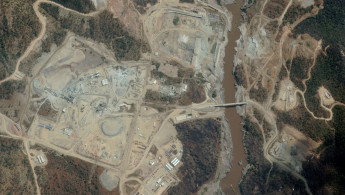Agreement eases tensions over Ethiopian Dam
Agreement eases tensions over Ethiopian Dam
Analysis: Egypt, Sudan and Ethiopia have reached agreement regarding the Renaissance Dam that diplomats say is a sign of improving relations.
2 min read
Egypt, Sudan and Ethiopia declared Friday they had reached the basis of an agreement to resolve differences over the Grand Ethiopian Renaissance Dam [AR]. The agreement submitted to the heads of the three countries for final approval is in reaction to Egyptian fears about the building of the dam.
The agreement was reached after three days of hard negotiations [AR] in Khartoum between the foreign ministers of the three countries; Ali Karti of Sudan, Sameh Shoukry of Egypt and Tadros Adhanom of Ethiopia. However, the talks were clouded by an air of secrecy, and even after the talks were concluded foreign ministers refused to disclose details.
Karti said the signing of the agreement by the three presidents was a clear sign of good will by the three parties.
"The agreement reflects the level of cooperation the three countries are willing to undertake to take advantage of resources obtained via the Blue Nile River and the hydroelectric power plant facility currently being built on the eastern basin,” Karti said.
For his part, Egypt's FM Shoukry, said the agreement was, "The beginning of established communication between the three countries, and for creating the technical and political frameworks that allow the relationship to develop between them in a manner that serves the interests of all their people."
Shoukry emphasised that the agreement includes bases that dictate the relations and cooperation regarding the eastern Nile basin and the Renaissance Dam.
"Through these bases, we will work hard to achieve the good relations our people aspire towards," he added.
Meanwhile, Ethiopia's Adhanom, described the agreement as a step forward that brings the partnership between the three countries to a higher level.
Egyptian Minister of Irrigation Hossam Maghazi said: "The agreement tackles the various concerns of the three countries, particularly about the dam's capacity and the time required to achieve maximum storage."
Maghazi explained that the agreement is only preliminary and tackles the political process and cooperation required for the dam to operat. Technical concerns were left to be tackled by the experts, he added.
Maghazi also said these experts were meeting in Khartoum to evaluate consultancy firms. "Two winners will be announced on 9 March. The selected firms will implement water and environmental studies and assessments," added Maghazi.
This article is an edited translation from our Arabic edition.
The agreement was reached after three days of hard negotiations [AR] in Khartoum between the foreign ministers of the three countries; Ali Karti of Sudan, Sameh Shoukry of Egypt and Tadros Adhanom of Ethiopia. However, the talks were clouded by an air of secrecy, and even after the talks were concluded foreign ministers refused to disclose details.
Karti said the signing of the agreement by the three presidents was a clear sign of good will by the three parties.
"The agreement reflects the level of cooperation the three countries are willing to undertake to take advantage of resources obtained via the Blue Nile River and the hydroelectric power plant facility currently being built on the eastern basin,” Karti said.
| The agreement is a step forward that brings partnership between the three countries to a higher level. |
For his part, Egypt's FM Shoukry, said the agreement was, "The beginning of established communication between the three countries, and for creating the technical and political frameworks that allow the relationship to develop between them in a manner that serves the interests of all their people."
Shoukry emphasised that the agreement includes bases that dictate the relations and cooperation regarding the eastern Nile basin and the Renaissance Dam.
"Through these bases, we will work hard to achieve the good relations our people aspire towards," he added.
Meanwhile, Ethiopia's Adhanom, described the agreement as a step forward that brings the partnership between the three countries to a higher level.
Egyptian Minister of Irrigation Hossam Maghazi said: "The agreement tackles the various concerns of the three countries, particularly about the dam's capacity and the time required to achieve maximum storage."
Maghazi explained that the agreement is only preliminary and tackles the political process and cooperation required for the dam to operat. Technical concerns were left to be tackled by the experts, he added.
Maghazi also said these experts were meeting in Khartoum to evaluate consultancy firms. "Two winners will be announced on 9 March. The selected firms will implement water and environmental studies and assessments," added Maghazi.
This article is an edited translation from our Arabic edition.



